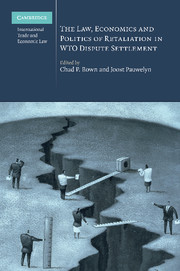Book contents
- Frontmatter
- Contents
- List of tables and figures
- Contributors
- Introduction: trade retaliation in WTO dispute settlement: a multi-disciplinary analysis
- PART I Background and goal(s) of WTO retaliation
- PART II A legal assessment after ten arbitration disputes
- PART III An economic assessment after ten arbitration disputes
- PART IV The domestic politics and procedures for implementing trade retaliation
- PART V Problems and options for reform
- 15 Evaluating the criticism that WTO retaliation rules undermine the utility of WTO dispute settlement for developing countries
- 16 Optimal sanctions in the WTO: the case for decoupling (and the uneasy case for the status quo)
- 17 Sanctions in the WTO: problems and solutions
- 18 WTO retaliatory measures: the case for multilateral regulation of the domestic decision-making process
- 19 The WTO Secretariat and the role of economics in panels and arbitrations
- 20 The equivalence standard under Article 22.4 of the DSU: a ‘tariffic’ misunderstanding?
- PART VI New frontiers and lessons from other fields
- Index
18 - WTO retaliatory measures: the case for multilateral regulation of the domestic decision-making process
Published online by Cambridge University Press: 26 February 2010
- Frontmatter
- Contents
- List of tables and figures
- Contributors
- Introduction: trade retaliation in WTO dispute settlement: a multi-disciplinary analysis
- PART I Background and goal(s) of WTO retaliation
- PART II A legal assessment after ten arbitration disputes
- PART III An economic assessment after ten arbitration disputes
- PART IV The domestic politics and procedures for implementing trade retaliation
- PART V Problems and options for reform
- 15 Evaluating the criticism that WTO retaliation rules undermine the utility of WTO dispute settlement for developing countries
- 16 Optimal sanctions in the WTO: the case for decoupling (and the uneasy case for the status quo)
- 17 Sanctions in the WTO: problems and solutions
- 18 WTO retaliatory measures: the case for multilateral regulation of the domestic decision-making process
- 19 The WTO Secretariat and the role of economics in panels and arbitrations
- 20 The equivalence standard under Article 22.4 of the DSU: a ‘tariffic’ misunderstanding?
- PART VI New frontiers and lessons from other fields
- Index
Summary
The present contribution argues that the domestic decision-making process WTO members use to prepare and adopt WTO retaliatory measures is a legitimate concern for the WTO and that there would be merit in regulating this process at the multilateral level.
The importance of the domestic process
One of the key differences between dispute settlement under the GATT and dispute settlement under the WTO has been the frequency of recourse to retaliation. During the close to 50 years of the GATT there was but one single dispute in which the GATT Council authorized a ‘suspension of concessions or other obligations’. On the other hand, under the WTO, which has been in existence only since 1995, there have so far been six disputes in which the DSB has granted authorization to retaliate. Moreover, there currently are an additional two WTO disputes in which authorization to retaliate might be granted in the future. If retaliation remains a recurrent feature of international trade relations under the WTO, and the indications are that it will, it becomes pertinent to ask whether existing DSU rules deal with all aspects of retaliation adequately. To determine whether existing Dispute Settlement Understanding (DSU) rules on retaliation are adequate, it is necessary first to consider what factors determine the success and acceptance of WTO retaliation as a remedy. It would seem that three factors in particular are key: namely, effectiveness, cost and fairness.
- Type
- Chapter
- Information
- Publisher: Cambridge University PressPrint publication year: 2010
- 2
- Cited by

